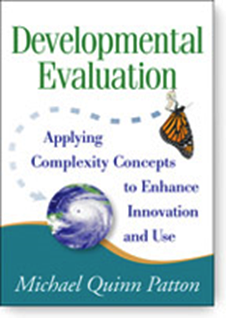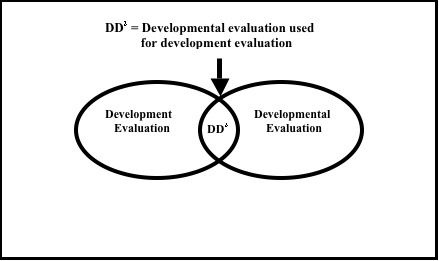I am Michael Quinn Patton, author of Developmental Evaluation: Applying Complexity Concepts to Enhance Innovation and Use. I am an independent consultant based in Saint Paul, Minnesota. I have been doing and writing about evaluation for over 40 years. This week features posts by colleagues and clients engaged in various developmental evaluation initiatives. 
Rad Resource:Developmental evaluation (DE) informs and supports innovative and adaptive development in complex dynamic environments. DE brings to innovation and adaptation the processes of asking evaluative questions, applying evaluation logic, and gathering and reporting evaluative data to support project, program, product, and/or organizational development with timely feedback. The first chapter of the Developmental Evaluation book is available online.
Hot Tip: Understand the difference between formative and developmental evaluation. Developmental evaluation is NOT ongoing formative evaluation. This is a common confusion. Developmental evaluation supports adapting and changing an innovation for ongoing development. Formative evaluation supports improving a model and, as originally conceptualized, serves the purpose of getting ready for summative evaluation (Michael Scriven, 1967, “The methodology of evaluation “).
Hot Tip: Developmental evaluation is NOT the same as development evaluation. This is another common confusion. Development evaluation refers to evaluations done in developing countries. Some development evaluation is developmental, but by no means all.
Hot Tip: Developmental evaluation may be called by other names: adaptive evaluation, real time evaluation, or emergent evaluation. I often hear from folks that they’ve been doing DE without calling it that. Here’s an example just published in the journal EVALUATION.
Cool Trick: Go to the AEA Public eLibrary and search for developmental evaluation. You’ll find lots of presentations and examples.
This week, we’re diving into issues of Developmental Evaluation (DE) with contributions from DE practitioners and authors. Do you have questions, concerns, kudos, or content to extend this aea365 contribution? Please add them in the comments section for this post on the aea365 webpage so that we may enrich our community of practice. Would you like to submit an aea365 Tip? Please send a note of interest to aea365@eval.org. aea365 is sponsored by the American Evaluation Association and provides a Tip-a-Day by and for evaluators.

